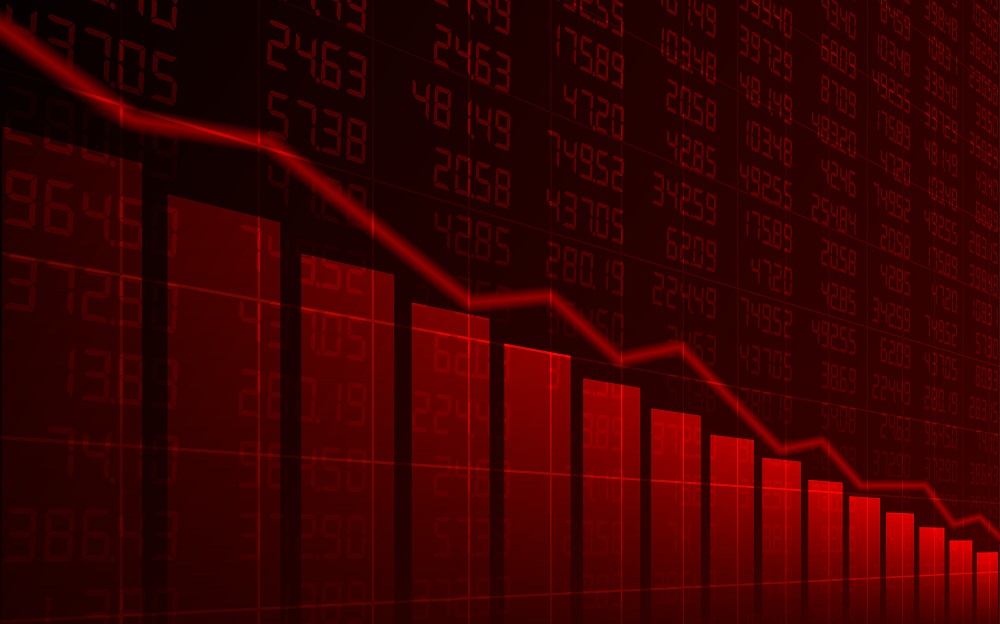U.S. Market Loses $2 Trillion as Major S&P 500 Stocks Decline
05.08.2024 17:15 1 min. read Alexander Stefanov
A recent analysis reveals that significant declines in just 10 S&P 500 stocks, including major players like Nvidia, Microsoft, and Amazon, have erased over $2 trillion from investor portfolios since mid-July.
This loss exceeds the total market value of the entire S&P 500 in the mid-1980s.
These substantial losses are concentrated in a few tech giants heavily involved in AI, which had previously driven the S&P 500 to new highs earlier in the year.
Concerns over whether these companies were overvalued have contributed to their steep declines. The combined losses of these 10 stocks represent approximately two-thirds of the $3 trillion drop experienced by the entire S&P 500 during this period, driven by mounting recession fears.
Dan Ives from Wedbush describes the situation as a severe market sell-off, exacerbated by a weaker jobs report and concerns about the Federal Reserve’s delayed actions. The tech sector, in particular, has been at the epicenter of this downturn.
Among the hardest hit, Nvidia has seen its stock fall by around 15% since July 15, resulting in a staggering $461 billion loss— the largest drop for any S&P 500 company since then.
Similarly, Microsoft, despite being a leading player in AI, has experienced a nearly 10% decline in its stock value since mid-July, leading to a $328 billion loss. While still up nearly 8% for the year, Microsoft’s Composite Rating has fallen to 72, reflecting investor concerns.
-
1
Polygon Breaks from Decentralization as Sandeep Nailwal Assumes Full Control
11.06.2025 20:00 2 min. read -
2
KuCoin Plants Its Flag in Bangkok With a Licensed Thai Exchange
14.06.2025 13:00 1 min. read -
3
Nvidia CEO Urges UK to Invest in AI Infrastructure or Risk Falling Behind
10.06.2025 9:00 1 min. read -
4
Why Gold Could Be the Smart Play Amidst US Debt Surge
11.06.2025 11:00 1 min. read -
5
Warren Buffett Narrows His Bets as He Prepares to Step Down
14.06.2025 16:00 2 min. read
What Brian Armstrong’s New Stats Reveal About Institutional Crypto Growth
Coinbase CEO Brian Armstrong has spotlighted a significant acceleration in institutional crypto adoption, driven largely by the surging popularity of exchange-traded funds and increased use of Coinbase Prime among major corporations.
What Will Happen With the Stock Market if Trump Reshapes the Fed?
Jefferies chief market strategist David Zervos believes an upcoming power shift at the Federal Reserve could benefit U.S. equity markets.
U.S. Bank Advises Clients to Drop These Cryptocurrencies
Anchorage Digital, a federally chartered crypto custody bank, is urging its institutional clients to move away from major stablecoins like USDC, Agora USD (AUSD), and Usual USD (USD0), recommending instead a shift to the Global Dollar (USDG) — a stablecoin issued by Paxos and backed by a consortium that includes Anchorage itself.
Vitalik Buterin Warns Digital ID Projects Could End Pseudonymity
Ethereum co-founder Vitalik Buterin has voiced concerns over the rise of zero-knowledge (ZK) digital identity projects, specifically warning that systems like World — formerly Worldcoin and backed by OpenAI’s Sam Altman — could undermine pseudonymity in the digital world.
-
1
Polygon Breaks from Decentralization as Sandeep Nailwal Assumes Full Control
11.06.2025 20:00 2 min. read -
2
KuCoin Plants Its Flag in Bangkok With a Licensed Thai Exchange
14.06.2025 13:00 1 min. read -
3
Nvidia CEO Urges UK to Invest in AI Infrastructure or Risk Falling Behind
10.06.2025 9:00 1 min. read -
4
Why Gold Could Be the Smart Play Amidst US Debt Surge
11.06.2025 11:00 1 min. read -
5
Warren Buffett Narrows His Bets as He Prepares to Step Down
14.06.2025 16:00 2 min. read


